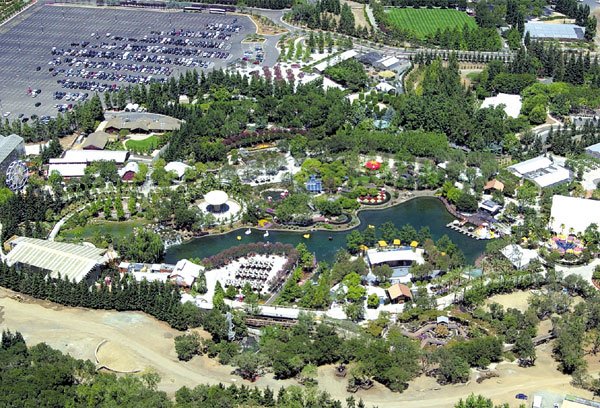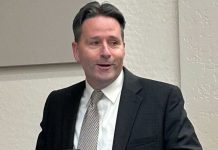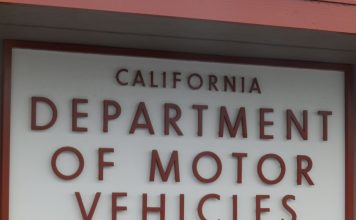UPDATED: After mulling over the issue for a day and a half,
Councilman Perry Woodward has convinced his colleagues to bring the
public in on discussions regarding the potential sale of Gilroy
Gardens to offshore investors.
After mulling over the issue for a day and a half, Councilman Perry Woodward has convinced his colleagues to bring the public in on discussions regarding the potential sale of Gilroy Gardens to offshore investors.
In a closed session Monday night, the council discussed the “unsolicited” and “unexpected” offer by TanGram Global Group and Jangwon Group, based in South Korea and Guam, to buy the park and the 536 acres of mostly untouched land it sits on. Under state law, the council may hold closed sessions to discuss only the price and the terms of payment being offered for a particular parcel of property – which it did Monday night – but not the property’s future or any development plans. That is something the public should take part in with the council, Councilman Perry Woodward said, especially after the body purchased the land for $13.2 million in February with the promise of protecting it from future development.
“After a little reflection, I think it is imperative that we hold an open council study session to discuss the future of the Gilroy Gardens lands (in general, not any specific proposal) and what the community thinks about the potential sale to private interests,” Woodward wrote in an e-mail to City Administrator Tom Haglund Wednesday morning.
The entire council has said it wants to hear from residents, and city staff is assembling a task force of community members to help the council determine the future of Gilroy Gardens, but the off-shore proposal – and the council’s closed session consideration of that proposal – occurred before that could happen. Mayor Al Pinheiro said he expects to have the open session Oct. 27, after council members discuss the idea and their schedules at next Monday’s meeting.
“It’s the timing of all this that has changed,” Pinheiro said. “We had already had a conversation of this being brought to the full community, but we wanted to see if there was any substance to what we may be getting” from the foreign investors.
Woodward and the council have also been working to pass his signature sunshine ordinance, which would build on state open government requirements. To convene a closed session under Woodward’s proposed ordinance will require a majority vote by the council instead of the mayor and city administrator simply scheduling a closed session to discuss personnel, legal or property matters.
“When I go into closed sessions now, there’s never an opportunity to say this ought to be discussed in open session,” Woodward said. “The system is flawed, so under the sunshine ordinance, as soon as we go into closed session, there would be a discussion about why we’re here.”
While hammering out the sale price and exact terms of payment behind closed doors is a prudent negotiating tactic, the council should not rush this closed session before ample public discussion takes place, Woodward said.
The overseas investors have been behind resort-like projects in America before, according to Haglund, but their offering price for the Gardens and any development plans they have remain unknown. During Monday night’s closed session, the council voted unanimously to create an ad-hoc subcommittee including Pinheiro, Woodward and Councilwoman Cat Tucker. They will explore the proposal’s details and the companies’ histories, but in the meantime, it appears likely the public will have a chance to comment.
The California Secretary of State has had a Los Angeles-based business on file by the name of Tangram Global Group USA since Aug. 15, but the person on file could not be reached and calls to the registered office building went unanswered. The secretary’s office also had a Jangwon International Trading Co. on file, but a company profile described a drug company. And Michael Russell – the business broker and president of Carmel Business Sales who has tendered the Gardens offer on behalf of his overseas clients – has not return messages. Russell did say last week, though, that information about his clients and their proposal would surface as discussions with the council advance.
Assistant City Attorney Andy Faber and Haglund have agreed that the state’s open government law, known as the Brown Act, does prevent the council from striking development plans with negotiators – a process conducted in an open forum by the planning commission and city council – but they have also said “broad” provisions in the act allow the council to discuss issues related to the sale of the Gardens.
“The council needs to stay on topic and stay within the broad safe harbor area provided by the Brown Act,” Haglund said. “In terms of evaluating (the investors’) offer, it would not be inappropriate for the seller (the city) to want to know why someone wants to buy it.”
But the Fourth District Court of Appeal in San Diego ruled in 2002 – in Shapiro v. City Council of San Diego – that it is unlawful for councils to discuss the future design work of, say, a high-end resort at a sale site or to gab about future environmental reports or infrastructure and parking improvements there. The Court of Appeal also agreed with the lower trial court’s judge, who wrote that councils must “limit topics to instructions to its negotiators regarding the price and terms of payment for the purchase, sale, exchange or lease of specific real property.”
That price could be as much as $60 million, according to council members’ estimates during the time of the park’s purchase. That money could surely erase the city’s $3.9 million deficit, fix all the city’s sidewalks, pay for a new library and thaw a city-wide hiring freeze.
“The prospect of getting quick money is appealing, but we bought this park for the citizens,” Dillon said.
Russell’s client’s offer is not the only one the city has received.
Parc Management, a Florida-based theme park operator, made a previous offer that a sub-committee of the city council – which includes Councilmen Perry Woodward, Dion Bracco and Bob Dillon – will discuss with the board soon. The company has indicated replacing Michael Bonfante’s struggling horticultural dream with a water park for children.
Then there’s Woodward’s much smaller business idea of selling a roughly 10-acre parking lot to Eagle Ridge. The gated community borders the expansive and vastly under-used parking lot that serves the park’s administrative staff.














